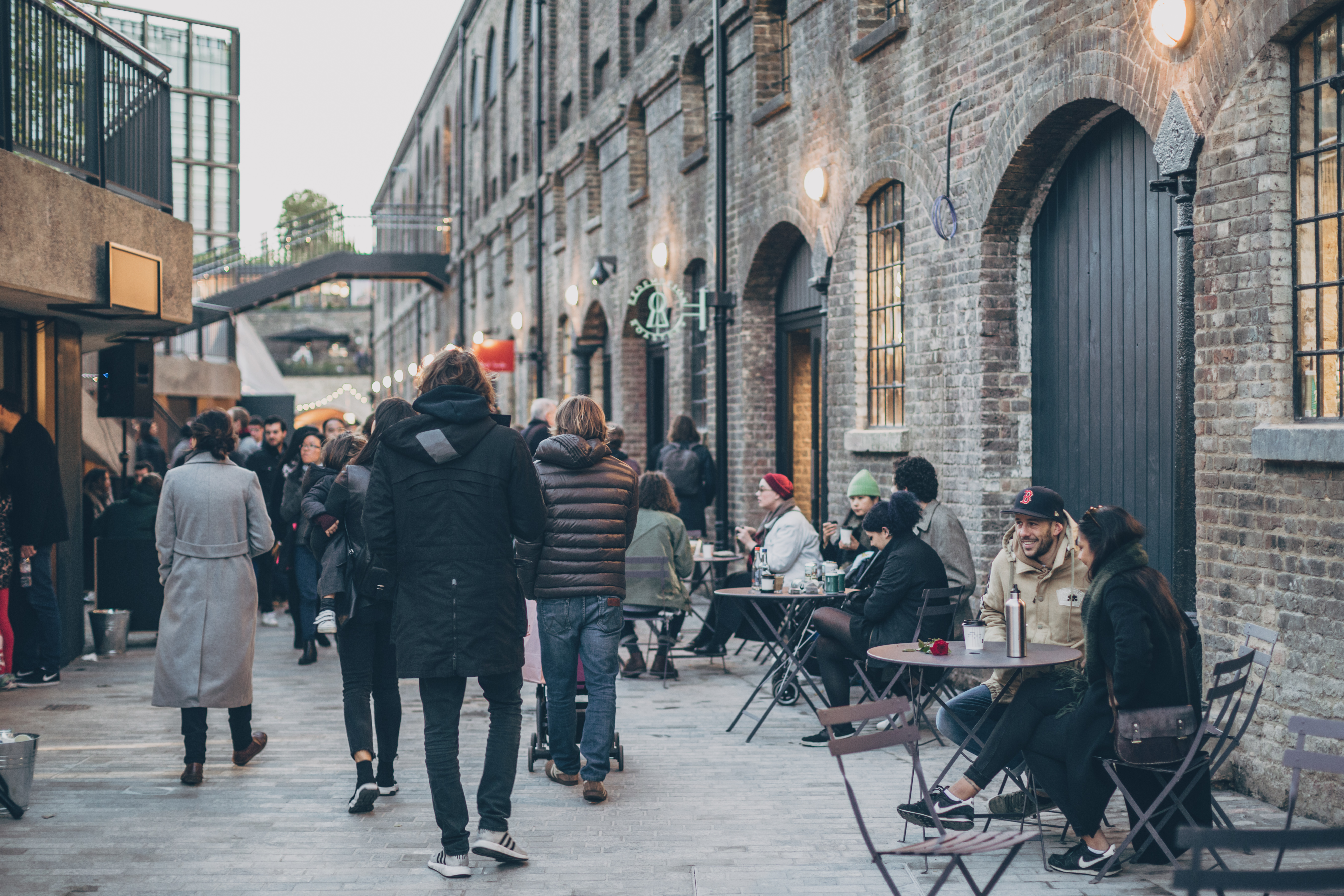Project showcase
King’s Cross

King’s Cross is home to 67 acres of architecture, offices, destination restaurants and retail, homes and education. The landmark development is not due to complete until 2023; however is already seen as a lively place to visit, day and night. The area’s industrial past has inspired the 50 new and 20 repurposed buildings. The public spaces between them are a mix of parks, streets, squares, and gardens, with Granary Square at its heart.
These open spaces encourage social interaction through features such as fountains, long sharing benches and moveable street furniture. The year round inclusive and interactive curated events and enlivenment programme utilises these open spaces, and aims to prompt conversation and the sharing of ideas between people from different backgrounds. Already known as a foodie hotspot, King’s Cross is now established as a shopping destination. Coal Drops Yard, which opened in October 2018, has brought a new crowd to King’s Cross who are interested in the provenance of fashion and lifestyle products, sustainability and shopping more consciously. A key asset in making King’s Cross a true community is the purpose- built King’s Cross Academy, a state primary school which opened in September 2015 and is sponsored by the developer. This sits alongside Central Saint Martins, the world- renowned arts and design college and the first tenant to arrive on site in 2010. King’s Cross has over 20,000 people working in the area for companies including Google, YouTube, Havas, Camden Council, The Office Group and Universal Music. 10.7 million people visit King’s Cross every year.
Describe this place and the point it has reached in its development, as well as when it is expected to complete?
King’s Cross is home to 67 acres of inspiring businesses, outstanding architecture, destination restaurants and retail, homes and a vibrant cultural scene. The landmark development is not due to complete until 2023; however is already seen as London’s new creative neighbourhood and a lively place to visit day and night. The area’s industrial past has inspired the 50 new and 20 repurposed buildings. The public spaces between them are a mix of parks, streets, squares, and gardens, with Granary Square at its heart. These open spaces encourage social interaction through features such as fountains, long sharing benches and moveable street furniture.
The year round inclusive and interactive curated events and enlivenment programme utilises these open spaces, and aims to prompt conversation and the sharing of ideas between people from different backgrounds. Already known as a foodie hotspot, King’s Cross is now established as a shopping destination. Coal Drops Yard, which opened in October 2018, offers a wonderful and unexpected mix of independent shops and signature brands, and has brought a new crowd to King’s Cross who are interested in the provenance of fashion and lifestyle products, sustainability and shopping more consciously.
A key asset in making King’s Cross a true community is the purpose-built King’s Cross Academy, a state primary school which opened in September 2015 and is sponsored by the developer. This sits alongside Central Saint Martins, the world-renowned arts and design college and the first tenant to arrive on site in 2010.
Why should this place be recognised with a Pineapple Award? How has it made a promising start on the journey to completion?
King’s Cross is already considered a fully-formed but also continually evolving neighbourhood by the majority of people who live, work and visit, thanks to the approach by its developer. The highest standard of quality has been a consistent driver, from its design and management, through to the tone of voice and set of core values. This has helped to not just attract visitors and praise from around the world, but more importantly, a new community has been realised alongside existing communities. This early-life success has been achieved in part by the theory that people are the ultimate shapers of a place, and an acceptance of diversity of opinion.
The first tenant on site, Central Saint Martins, perhaps best embodies the spirit of the area - an adventurous community of students and academics, with a shared vision to make King’s Cross a hotbed of creativity and inclusion. King’s Cross has attracted some of the smartest tenants in the world with over 20,000 people working in the area for companies including Google, YouTube, Havas, Camden Council, The Office Group and Universal Music. The mix of events, retail and spaces mean it is somewhere people genuinely want to spend their leisure time: 10.7 million people visit King’s Cross every year. The regeneration has also created a multiplier effect, bolstering the local economy by an estimated £48m GVA per annum across its home Boroughs, Camden & Islington.
How are you responding to changes in changing demographics, shifting policy, transport habits and the climate crisis since winning planning and as the project unfolds?
‘Principles for a Human City’ was created in 2001 (by the London Borough of Camden and King’s Cross Partnership) to define the principles which would guide King’s Cross. It ensured that the development was based around a human- centric urban framework that allowed the scheme to evolve with policy and demographics. One of the foundations for the success of King’s Cross is its public transport links. There is no commuter parking on site and cycling is promoted (>5,500 cycle spaces on- site), this ensures that 18% of people working here walk or cycle to work. King’s Cross has been designed to minimise its carbon footprint.
The site is powered by one of the UK’s most sophisticated District Energy Networks (DENs) and seven offices are certified BREEAM ‘Outstanding’ (25% of ‘Outstanding’ certified offices in the UK). While the DEN is low carbon, King’s Cross is working to evolve the entire site’s energy consumption and become the world’s first zero carbon estate. 40% of the site area is devoted to public realm. Additionally, 40% of the non-heritage roof area is devoted to green spaces, allowing wildlife to thrive among the 600 species of plant and 400 trees planted on site.
A number of partnerships allow local people to benefit from the opportunities created on the development. One of the most impactful is King’s Cross Recruit which has placed over 1,000 people into jobs over the last three years, with 66% of recruits coming from the local borough.
Please share any figures that support your entry – for example, attendance figures, support for planning, community feedback, Article references or quotes from supporters or reviews in the media may also be included.
“You don’t have to be a traditionalist or a modernist to enjoy the new King’s Cross development, a brilliant piece of urbanism created on the site of what used to be marshalling yards. It is easy to navigate, fun to be in, with some old buildings (including converted gasometers), but mostly new ones. We need more of the same.” Clive Aslet, The Daily Telegraph, 29 January 2020 “This regenerated wasteland, with its landmark gasholders, is the new hip location to live, work and chill…One of the most extensive examples of urban regeneration anywhere in Britain is the rebirth of King’s Cross.”
Anne Ashworth, The Times, 7 June 2019 “It is hard to think of any other urban renewal that is more deserving of being described as ‘a triumph’.” Jonathan Prynn, Evening Standard, 25 April 2019 “Whether its children splashing around in the fountains, Londoners enjoying the boats pass by from the canal steps or special events such as the Floating Cinema that take place throughout the year, Granary Square is a magnificent and animated spectacle.
It’s also flanked by an exemplary selection of restaurants and bars.” Laura Piccirillo, Culture Trip, 18 April 2019 “King’s Cross used to be the badlands of North London but is now booming, with restaurants, bars and fashion all shunting for position.” Rick Jordan, Conde Nast, 22 January 2019
Festival of Pineapples
24-26 February 2026
Pineapples prize giving night
April
Pineapples at Festival of Place
10 June 2026
© The Pineapples - Tweak Ltd. 124 City Road, London, EC1V 2NX. Tel: 020 3326 7238




